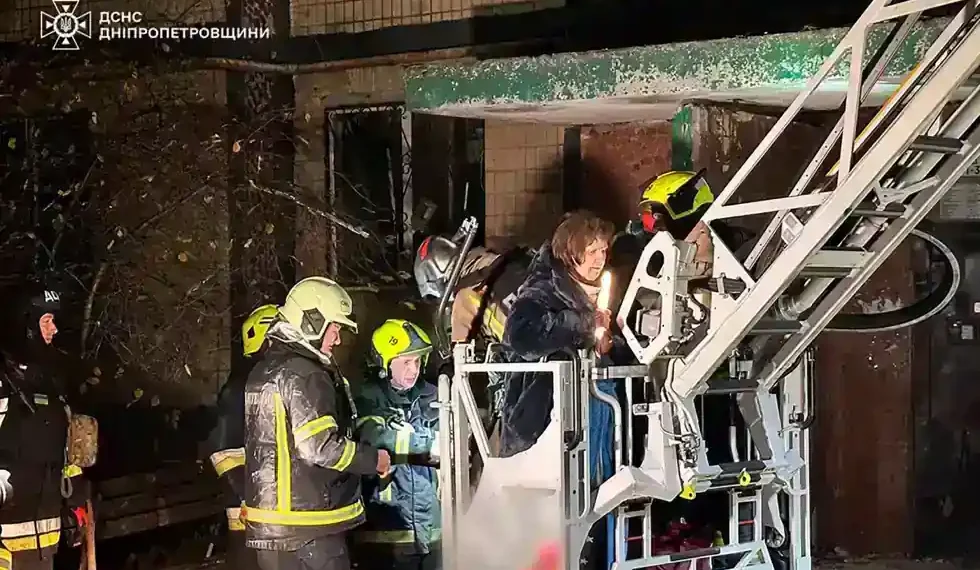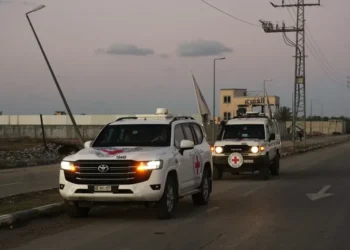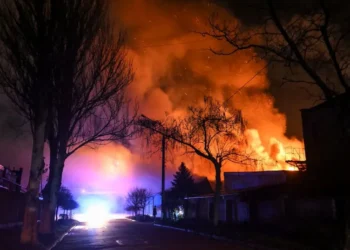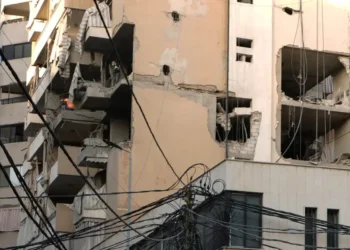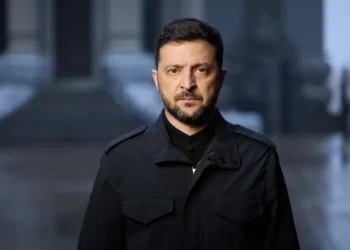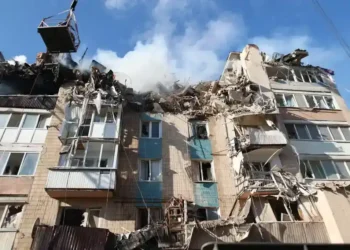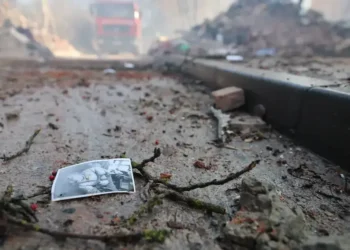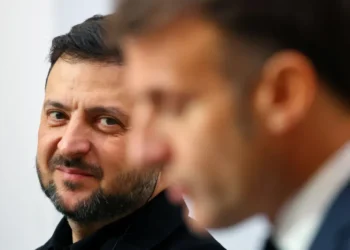Russian drone and missile strikes killed at least four people and wounded 12 others in Ukraine early Saturday, in one of the largest overnight bombardments of recent weeks. The attacks, which struck residential and energy facilities in several regions, left widespread damage and renewed fears of a severe winter energy crisis.
Fatal Strikes in Dnipro and Kharkiv
Authorities reported that a Russian drone slammed into an apartment building in the eastern city of Dnipro while residents were sleeping. Three people were killed and several others injured, including two children. A fourth fatality occurred in Kharkiv, where a worker at an energy company died following strikes on local infrastructure. Emergency crews said several apartments in the nine-story Dnipro building were destroyed and fires broke out across multiple floors before being contained.
Nationwide Drone and Missile Barrage
Ukraine’s Air Force stated that Russia launched a total of 458 drones and 45 missiles, including 32 ballistic missiles, as part of a coordinated overnight assault. Ukrainian defense systems intercepted 406 drones and nine missiles, but 25 locations across the country were hit. Energy Minister Svitlana Grynchuk said power was switched off in several regions to prevent further damage as emergency crews worked to restore electricity.
Escalating Battle for Pokrovsk
Meanwhile, heavy fighting continues around the strategic eastern city of Pokrovsk, a key defensive stronghold in Ukraine’s Donetsk region. Both Kyiv and Moscow are reportedly seeking to demonstrate battlefield momentum as diplomatic pressure mounts on Washington. Russian forces claimed to have encircled Pokrovsk and nearby Myrnohrad, though Ukrainian officials did not confirm these reports. Analysts say control of Pokrovsk could significantly influence future peace negotiations and U.S. support decisions.
Putin Orders Nuclear Test Preparations
Amid the intensified fighting, Russian Foreign Minister Sergey Lavrov announced that work has begun on President Vladimir Putin’s directive to prepare for a possible nuclear test. The order, issued earlier in the week, followed comments by U.S. President Donald Trump suggesting Washington might resume atomic testing for the first time in 30 years. The move raised global concerns about a renewed arms race and the erosion of nuclear non-proliferation norms.
Energy Infrastructure Under Siege
Russian missile and drone strikes have increasingly targeted Ukraine’s energy facilities, disrupting power supplies in multiple regions. The Russian Defense Ministry claimed that Saturday’s attacks were aimed at military and energy sites supporting Ukrainian forces. Ukraine’s state energy company, Centrenergo, confirmed that thermal power plants in Kyiv, Kharkiv, and Donetsk regions were knocked offline again after being repaired from previous strikes.
Ukrainian Prime Minister Yulia Svyrydenko said on X (formerly Twitter) that “several major energy facilities” were hit in Kharkiv, Kyiv, and Poltava. She called the strikes an attempt to “weaponize winter,” depriving civilians of heat and electricity. Since early 2022, both countries have escalated attacks on each other’s energy infrastructure, with Russia seeking to cripple Ukraine’s grid and Ukraine targeting Russian refineries that finance Moscow’s war effort.
Ukraine’s Counterstrikes Inside Russia
In southern Russia, authorities reported repelling a “massive” Ukrainian drone strike on energy facilities in the Volgograd region. Governor Andrei Bocharov said the attack caused power outages in parts of the northwest but no casualties. Two civilians were injured in neighboring Saratov after drone debris shattered apartment windows. Russia’s Defense Ministry said 82 Ukrainian drones were downed overnight, including eight over Volgograd.
Zelenskyy Vows to Block Russian Oil Sales
Following weeks of Ukrainian long-range strikes on Russian oil refineries, President Volodymyr Zelenskyy reiterated his pledge to cut off Moscow’s access to European oil markets. “We will find a way to ensure there is no Russian oil in Europe,” Zelenskyy told reporters after meeting with military officials. His remarks came shortly after Hungary secured a one-year exemption from recent U.S. sanctions targeting Russia’s major state-run oil firms, Rosneft and Lukoil.
Hungarian Prime Minister Viktor Orbán, a close ally of former U.S. President Donald Trump, has argued that his landlocked nation cannot replace Russian crude without triggering an economic crisis. Critics, however, say Hungary’s continued reliance on Russian oil undermines broader European efforts to isolate Moscow. The U.S. sanctions, announced last month, could affect foreign buyers in Central Europe, India, and China by exposing them to secondary penalties.
Nuclear Plant Reconnected to Grid
Separately, the International Atomic Energy Agency (IAEA) confirmed that Ukraine’s Zaporizhzhia Nuclear Power Plant—under Russian control—has reconnected to the power grid using a second transmission line. The plant, the largest in Europe, had been running on diesel generators for a month after its last external power line was severed during clashes.
Although the facility is not producing electricity, it requires constant power to cool its reactors and prevent a potential nuclear disaster. Since Russia’s invasion began, the plant has lost external power 10 times, underscoring the ongoing risks to nuclear safety amid continued hostilities.
A War with No End in Sight
Nearly four years since Russia’s full-scale invasion, neither side shows signs of de-escalation. The recent surge in cross-border strikes highlights a war increasingly defined by infrastructure warfare, with both nations seeking to sap each other’s resources ahead of winter. Diplomatic efforts by the U.S. and European allies have so far failed to produce meaningful ceasefire talks, leaving millions of civilians facing another season of blackouts, shortages, and uncertainty.
This article was rewritten by JournosNews.com based on verified reporting from trusted sources. The content has been independently reviewed, fact-checked, and edited for accuracy, neutrality, tone, and global readability in accordance with Google News and AdSense standards.
All opinions, quotes, or statements from contributors, experts, or sourced organizations do not necessarily reflect the views of JournosNews.com. JournosNews.com maintains full editorial independence from any external funders, sponsors, or organizations.
Stay informed with JournosNews.com — your trusted source for verified global reporting and in-depth analysis. Follow us on Google News, BlueSky, and X for real-time updates.
